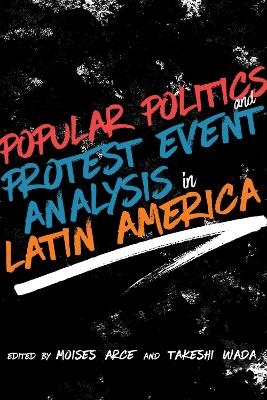
Popular Politics and Protest Event Analysis in Latin America
Seiten
2024
University of New Mexico Press (Verlag)
978-0-8263-6568-2 (ISBN)
University of New Mexico Press (Verlag)
978-0-8263-6568-2 (ISBN)
Examines the consequences of democracy and globalization on popular protests in Latin America, theorizing a broad shift of popular politics involving reactive and proactive mobilizations. A collaboration of sixteen distinguished scholars, the volume provides a unique collection of studies of protest events in ten Latin American countries.
The arrival of democracy and globalization was a watershed moment for Latin America. It produced a changing political and economic environment, where democracy provided challengers with expanding political opportunities but globalization precipitated economic threats to livelihoods and human welfare. This changing environment removed the state from modes of political representation, such as urban labor movements and their affiliated mass-party organizations, while unleashing more pluralistic, heterogenous, and decentralized patterns of popular representation. Reducing its role in production, the state became mostly a regulator of economic activities.
Arce and Wada's volume examines the consequences of democracy and globalization on popular protests in Latin America, theorizing a broad shift of popular politics involving reactive and proactive mobilizations. A collaboration of sixteen distinguished scholars with different specializations (economists, historians, sociologists, and political scientists) in both the Global North and South, the volume provides a unique collection of studies of protest events in ten Latin American countries: Bolivia, Brazil, Chile, Colombia, Costa Rica, Ecuador, Mexico, Nicaragua, Peru, and Venezuela.
The arrival of democracy and globalization was a watershed moment for Latin America. It produced a changing political and economic environment, where democracy provided challengers with expanding political opportunities but globalization precipitated economic threats to livelihoods and human welfare. This changing environment removed the state from modes of political representation, such as urban labor movements and their affiliated mass-party organizations, while unleashing more pluralistic, heterogenous, and decentralized patterns of popular representation. Reducing its role in production, the state became mostly a regulator of economic activities.
Arce and Wada's volume examines the consequences of democracy and globalization on popular protests in Latin America, theorizing a broad shift of popular politics involving reactive and proactive mobilizations. A collaboration of sixteen distinguished scholars with different specializations (economists, historians, sociologists, and political scientists) in both the Global North and South, the volume provides a unique collection of studies of protest events in ten Latin American countries: Bolivia, Brazil, Chile, Colombia, Costa Rica, Ecuador, Mexico, Nicaragua, Peru, and Venezuela.
Moisés Arce is the Scott and Marjorie Cowen Chair in Latin American Social Sciences and a professor in the Department of Political Science at Tulane University. Takeshi Wada is a professor in the Department of Area Studies and the director of the Latin American and Iberian Network for Academic Collaboration (LAINAC) at the University of Tokyo.
| Erscheinungsdatum | 16.03.2024 |
|---|---|
| Zusatzinfo | 7 maps, 70 graphs, 10 tables |
| Verlagsort | Albuquerque, NM |
| Sprache | englisch |
| Maße | 152 x 229 mm |
| Gewicht | 272 g |
| Themenwelt | Sozialwissenschaften ► Politik / Verwaltung ► Europäische / Internationale Politik |
| Sozialwissenschaften ► Soziologie | |
| ISBN-10 | 0-8263-6568-X / 082636568X |
| ISBN-13 | 978-0-8263-6568-2 / 9780826365682 |
| Zustand | Neuware |
| Haben Sie eine Frage zum Produkt? |
Mehr entdecken
aus dem Bereich
aus dem Bereich
Studienbuch
Buch | Hardcover (2023)
De Gruyter Oldenbourg (Verlag)
CHF 62,90
erfolgreiche Interessenvertretung durch Prozesskompetenz im komplexen …
Buch | Hardcover (2023)
Wiley-VCH (Verlag)
CHF 58,75


